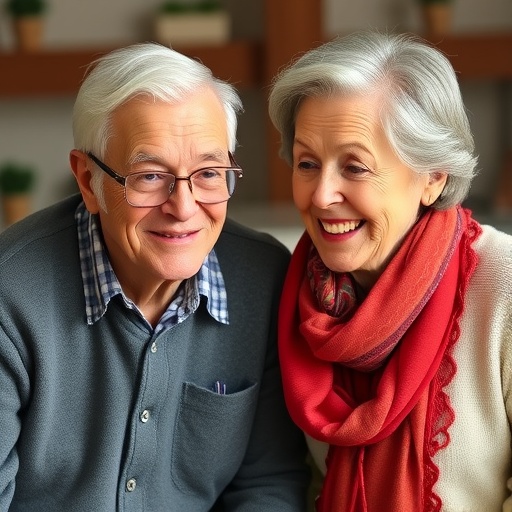A groundbreaking study conducted by researchers at Imperial College London and Coventry University has revealed a compelling link between older adults’ mindset about ageing and their physical recovery following a fall. Published in the Journal of the American Geriatrics Society, this first-of-its-kind research illuminates the powerful role psychological factors play in shaping the trajectory of post-fall recovery among older populations. The findings may revolutionize approaches toward rehabilitative care, emphasizing mental attitudes as critical components of physical healing processes.
Falls are a significant health concern globally, especially among older adults aged 60 to 90, due to their potential to cause debilitating injuries, loss of independence, and even death. The financial burden on healthcare systems such as the NHS, which incurs an estimated £5 million daily cost attributable to falls, is immense. Despite this, recovery outcomes vary widely: many older individuals bounce back with minimal impairment, while others suffer lasting physical decline and increased dependency. The reasons for such disparities have remained elusive until now.
The research team analyzed longitudinal data obtained from nearly 700 older adults residing in England who had not experienced falls in the prior years to the study. Employing sophisticated psychometric measures extracted from the CASP19 questionnaire, the researchers assessed participants’ self-perceptions of ageing and mindset at baseline. Notably, participants who harbored more positive attitudes toward ageing—for instance, rejecting the notion that age should limit their activities—demonstrated markedly superior physical recovery metrics post-fall compared to their less optimistic peers.
Detailed recovery assessments included biomechanical parameters such as gait speed, one of the most reliable indicators of functional mobility and fall risk. Additionally, researchers evaluated dependency levels in activities of daily living (ADLs), as well as physical inactivity, which can exacerbate frailty. Astonishingly, individuals scoring highest on measures of positive ageing mindset exhibited dramatically reduced odds of presenting with slow gait speed, needing assistance for everyday tasks, and engaging in physical inactivity after their fall event, underscoring the protective effect of positive psychological constructs.
The study’s analyses meticulously controlled for confounding variables including age, gender, pre-existing depression, baseline physical function, and injury severity resulting from falls. This rigorous methodology ensures that the observed associations could not simply be attributed to demographic or clinical differences. Instead, the data robustly support the hypothesis that mindset on ageing uniquely modulates physical resilience and recovery potential, independent of traditional biomedical factors.
Lead researcher Dr. Toby Ellmers from Imperial College noted the profound implications of the findings: “Our work suggests that how individuals perceive their own ageing process can confer significant physical health advantages post-injury. This psychological resilience likely interacts with biological mechanisms to influence neuromuscular recovery, motivation, and engagement with rehabilitative therapies.” His collaborator, Dr. Mathew Hill of Coventry University, further highlighted this as a pioneering link, stating that prior studies recognized negative ageing beliefs as risk factors for poor health outcomes but rarely explored recovery trajectories after acute physical events like falls.
Neuroscientific perspectives provide insight into potential underlying mechanisms. Positive ageing mindsets may attenuate stress-related neuroendocrine responses, reduce inflammatory pathways, and foster greater engagement with physical activity, all conducive to tissue repair and functional restoration. Moreover, such mindsets may bolster cognitive factors like self-efficacy and problem-solving, which can enhance adherence to rehabilitation regimens and adaptive coping post-fall, thereby facilitating more rapid and comprehensive recovery.
Despite the compelling evidence, the researchers acknowledge limitations inherent in observational designs, including the inability to definitively establish causality. The study also did not quantify fall severity beyond injury presence, leaving open questions about precise physical trauma’s interplay with mindset. Future research avenues include intervention trials aiming to cultivate positive psychological constructs among older adults and assessing resultant impacts on fall recovery and general ageing trajectories.
The implications for clinical practice and public health are profound. Simple, scalable psychological interventions—such as structured conversations emphasizing the empowerment and opportunities in later life, cognitive-behavioral strategies to reframe ageing narratives, or peer-supported community programs—could be integrated alongside physical rehabilitation protocols. Such integrative approaches may reduce healthcare burdens by improving recovery outcomes, sustaining autonomy, and potentially lowering repeat fall rates.
On a societal level, addressing ageism—both external and internalized—is vital. This study underscores the detrimental consequences of negative self-perceptions of ageing, and conversely, the empowering potential of fostering positive ageing identities. Campaigns and policies promoting age inclusivity and respect may contribute indirectly to healthier ageing populations capable of resilient responses to physical setbacks.
This research reinforces a holistic understanding of ageing as a multidimensional interaction between biology, psychology, and social environment. Recovery from falls, traditionally seen predominantly through a biomedical lens, now demands attention to mental frameworks shaping recovery efficacy. As populations worldwide age, harnessing the power of positive ageing mindsets could represent a transformative frontier in geriatric medicine and rehabilitation science.
In summary, this novel study provides convincing evidence that older adults’ beliefs about ageing critically influence their physical recovery after falls. Those who maintain a positive outlook not only demonstrate better functional mobility and independence but also avoid physical inactivity, a key risk factor for further decline. Going forward, cultivating positive ageing mindsets should become a cornerstone of interventions designed to optimize healthspan and quality of life for older individuals.
Subject of Research: People
Article Title: Positive mindset about ageing in over-60s linked to better recovery after a fall
News Publication Date: 21-May-2025
Web References:
10.1111/jgs.19486
References:
Self-Perceptions of Aging Predict Recovery After a Fall: Prospective Analysis From the English Longitudinal Study of Aging, Journal of the American Geriatrics Society
Keywords: Aging populations, falls, physical recovery, mindset, older adults, gait speed, activities of daily living, psychological resilience
Tags: CASP19 questionnaire in researchfalls among seniorsfinancial burden of fallshealth concerns for older populationsimpact of mindset on healingimproving recovery outcomes for elderlylongitudinal study on agingmental attitudes and physical healthNHS costs related to fallsPositive aging mindsetpost-fall recovery in older adultspsychological factors in rehabilitation





